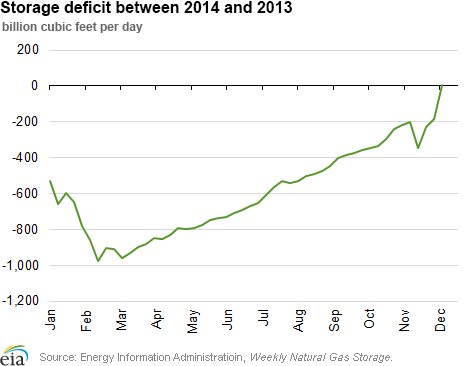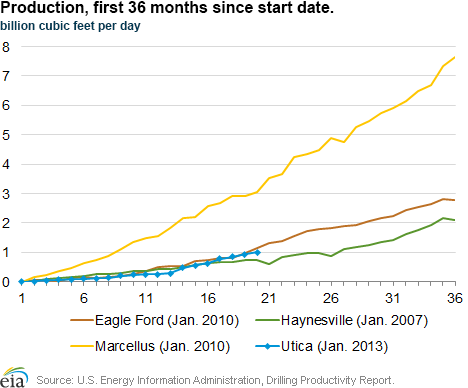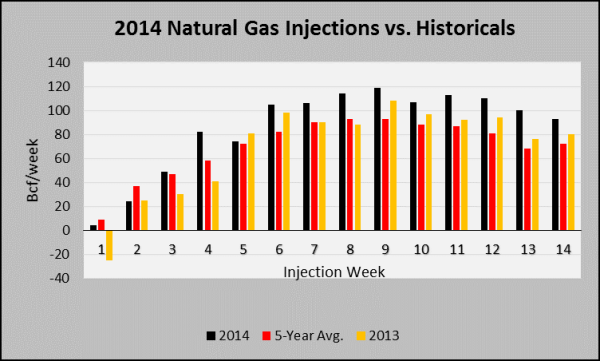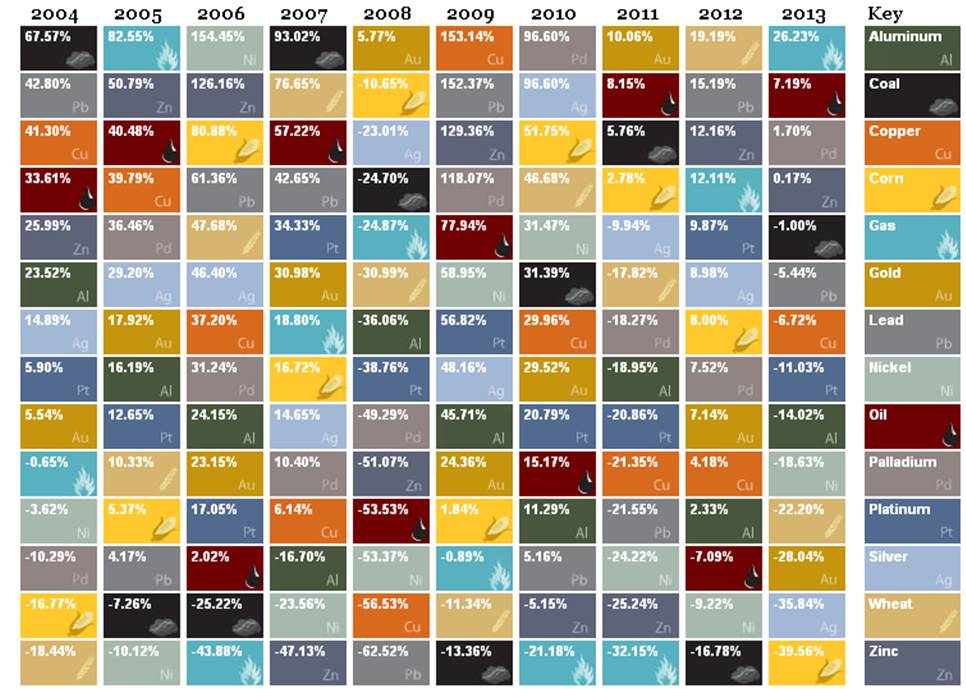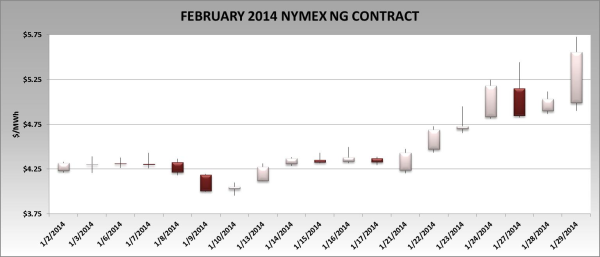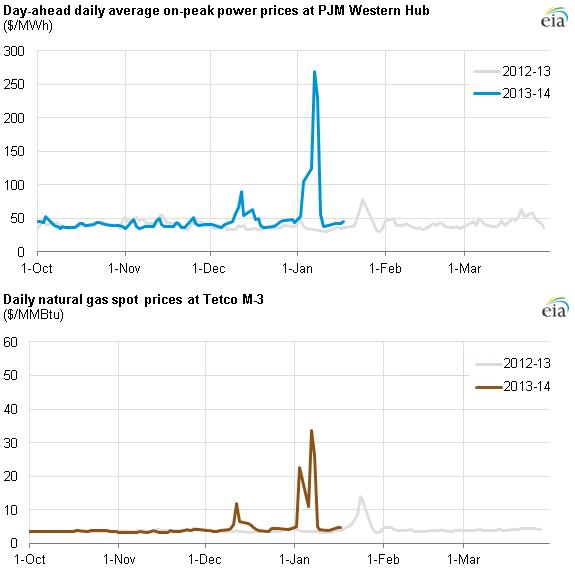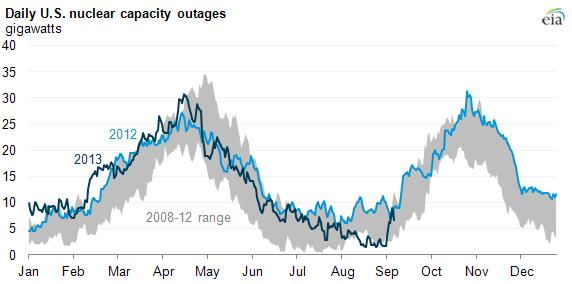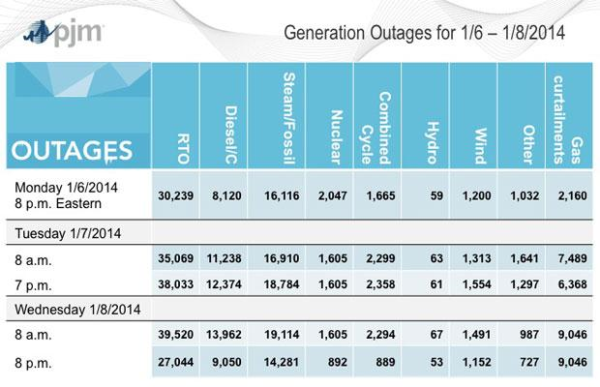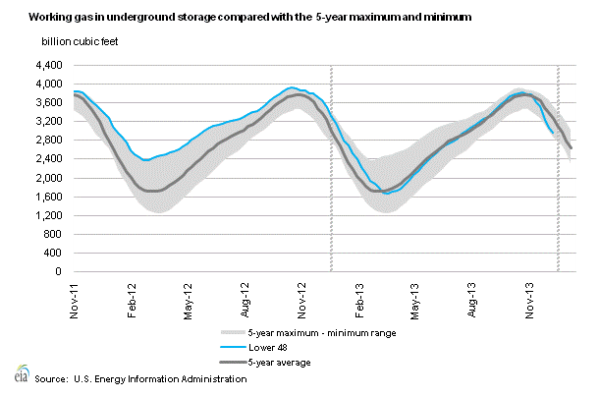Massive contrast between colder than normal temperatures in Nov-2014 and above normal temperatures in Dec-2014 have caused very high price volatility in the Natural Gas futures market. Shifts in weather forecasts and record production have been the main price action drivers during the first half of the winter.
Natural Gas Supply Shortage Concerns Have Eased
Posted by Jennifer Chang on Dec 23, 2014 10:54:00 AM
Topics: system operators, Acclaim Energy Advisors, energy management consulting, risk management, energy procurement, weather outlook, reliable energy, demand response, energy regulations, energy savings, power generation, Weekly Energy Insights, natural gas, energy management, energy management consultants, strategic energy sourcing, reserve margin, energy price spikes, Price Spike, energy blog, power outages, Natural Gas Supply, NG Demand, energy supply, Winter Weather, demand, scarcity pricing, current outlook
During the fall, meteorologists sharpen their assumption to build their probability weighted winter weather forecast scenarios. From an energy perspective, this is also a critical time of the year. Since it is typically a period of low energy demand, there tend to be seasonal dips that provide good buying opportunities in natural and electricity. This year though, natural gas prices have been seesawing since mid-July 2014 due to the following reasons:
Topics: Heating Season\, Polar Vortex, Texas Energy, forward curve, winter strip, spot price, energy risk management, energy sourcing, Acclaim Energy Advisors, energy management consulting, energy, energy procurement, weather outlook, reliable energy, energy costs, power generation, Weekly Energy Insights, natural gas, Event, energy management, energy management consultants, strategic energy sourcing, reserve margin, Price Spike, energy blog, power outages, Natural Gas Supply, price volatility, reserve, report, energy storage, NG Demand, seasonal drought, energy supply, EIA, Texas, Winter Weather, U.S. energy, NG, forecasting, refueling season, NG contract
A brutal cold start of the year has been followed by moderate temperatures across the country. Natural gas prices have risen significantly since early January 2014, as inventories were being depleted at a faster than normal rate due to higher than normal heating demand. Nevertheless, record production and tepid demand after the spring months triggered a massive selloff in mid-June 2014, with the front month losing more than 20 percent to date. Early concerns of tight supply conditions ahead of the next heating season have eased due to weekly record or near-record injections. Electricity prices have also plunged not only because of the recent drop in natural gas prices, but also because of a drop in heat rates. In Texas, peak load had not been this low in June and July since 2010. Low electricity demand has depressed spot and forward heat rates.
Topics: energy risk management, energy sourcing, Acclaim Energy Advisors, risk management, energy procurement, weather outlook, reliable energy, demand response, energy reliability, power generation, Weekly Energy Insights, natural gas, Event, economic demand response, energy management, energy management consultants, strategic energy sourcing, Hurricane Season, reserve margin, energy price spikes, renewable energy, Price Spike, energy blog, power outages, Natural Gas Supply, price volatility, reserve, report, energy efficiency, mild weather, energy storage, NG Demand, seasonal drought
Natural gas inventories have recovered significantly after reaching an 11-year record low of 822Bcf in late March-2014. During the last nine weeks, natural gas injections into storage have outperformed historical levels, and eight of them exceeded 100Bcf/week. Moreover, the last nine injections have exceeded the five-year average gains by 24Bcf on average. The drivers behind these above normal injections are the following:
Topics: Texas Energy, tropical storm, hurricane, energy sourcing, Acclaim Energy Advisors, energy management consulting, risk management, energy, Energy Solutions, energy procurement, weather outlook, reliable energy, demand response, energy regulations, energy reliability, energy savings, Weekly Energy Insights, natural gas, energy management, Price Spike, energy blog, power outages, Natural Gas Supply, price volatility, mild weather, energy supply, Texas, load generators, Peak Demand, forecasting
Crude Oil and Natural Gas Top Commodity Performers in 2013: Natural Gas Price Action Recap
Posted by Jennifer Chang on Feb 14, 2014 8:43:00 AM
During this winter season, natural gas price volatility has been extreme as temperatures have fallen to unprecedented levels due to the breakdown of the polar vortex. Low temperature records were broken across the U.S., natural gas heating-related demand has risen and natural gas inventories have been depleted at a faster rate when compared to historical benchmarks. Nevertheless, natural gas has not been the most volatile commodity in recent years according to the U.S. Global Investors Periodic table of Commodities Returns. In the last 10 years, the most and the least volatile commodity returns have been registered in Nickel and Gold respectively. Crude Oil has been a top three performer in four of the last 10 years, while natural gas has only been in this category two out of the last 10 years.
Topics: Polar Vortex, energy risk management, energy sourcing, Acclaim Energy Advisors, energy procurement, weather outlook, reliable energy, demand response, energy regulations, energy reliability, energy savings, energy costs, power generation, Weekly Energy Insights, natural gas, Event, energy management, energy management consultants, energy price spikes, Price Spike, energy blog, power outages, Natural Gas Supply, price volatility, Winter Weather, curtailment, Emergency, NG contract
Highest NYMEX Natural Gas Expiration in Four Years: Tough Risk Management Lesson for Some
Posted by Jennifer Chang on Jan 31, 2014 5:16:00 PM
On January 2, 2014, the NYMEX Henry Hub NG February-2014 (front month) contract settled at $4.321/MMBtu, and on January 29, 2014, the contract expired at $5.557/MMBtu (see chart below). This was the highest expiration settlement price for the front month in four years. During the month of January, the front month contract rose $1.24/MMBtu, or 28.6%. The chart below shows that on expiration day (1/29/14) the front month price posted a $0.52/MMBtu or 10% gain for the day. The March 2014 contract followed suit and rallied almost 11%, settling at $5.465/MMBtu. During the expiration day, weather forecasts turned colder than previously expected, so market players that underestimated demand rushed to the market and were clobbered in a short squeeze.
Topics: energy risk management, energy sourcing, Acclaim Energy Advisors, energy, Energy Solutions, energy procurement, reliable energy, demand response, energy regulations, energy reliability, energy savings, energy costs, power generation, Weekly Energy Insights, natural gas, energy management, energy management consultants, energy price spikes, Price Spike, energy blog, Natural Gas Supply, price volatility, energy supply, U.S. energy, NG, curtailment, Emergency, gas gross production report, price direction, NG contract, NYMEX
NG Spot Prices Reach Record Levels and Boost Power Prices During January 2014
Posted by Jennifer Chang on Jan 24, 2014 5:17:00 PM
Two ruthless surges of arctic air, east of the Rockies, have taken over the eastern half of the country this month. The latest forecasts suggest that this weather pattern will continue to linger through the end of the month. Sub-zero temperatures are expected in the upper Midwest cities and the great lakes, including Chicago, Minneapolis and Detroit and possible below zero temperatures as far south as the Ohio River. Factoring in wind chill, temperatures are expected to be 20 or 30 degrees below zero. This weekend a couple of Canadian clippers will be followed by another arctic surge through mid-next week with conditions that could rival those from January 6, 2014. A Canadian clipper (a.k.a Alberta clipper) is a storm system during the winter months that originates from the Canadian Province of Alberta (or there close by). The term "clipper" originates from the quick speeds of clipper sailing ships. Thus, an Alberta clipper is a quick-moving winter storm system originating from Alberta, Canada. A clipper will usually bring smaller bursts of snow (generally 1-3 inches) along with colder temperatures and often times gusty winds (The National Oceanic and Atmospheric Administration).
Topics: energy risk management, Acclaim Energy Advisors, risk management, energy, Energy Solutions, energy procurement, weather outlook, reliable energy, demand response, energy regulations, energy reliability, energy savings, energy costs, power generation, Weekly Energy Insights, natural gas, Event, energy management, energy management consultants, energy price spikes, Price Spike, energy blog, energy supply, Winter Weather, U.S. energy, Peak Demand, mid-atlantic, new england, NG
More Nuclear Power Plants to Refuel in 2014 Compared to 2013: How Could This Affect Natural Gas Prices?
Posted by Jennifer Chang on Jan 17, 2014 1:34:00 PM
Platts recently reported that the 58 U.S. nuclear power plants totaling almost 60,000MW are expected to refuel in 2014, compared to 54 units totaling over 55,000MW in 2013. The analysis is based on historical refueling data from the US Nuclear Regulatory Commission.
Topics: energy risk management, Acclaim Energy Advisors, energy management consulting, energy procurement, reliable energy, energy regulations, energy reliability, energy costs, power generation, Weekly Energy Insights, energy management, energy price spikes, Price Spike, power outages, U.S. energy, capacity markets, nuclear units, power plants, refueling season
Arctic Blast Shuts Down 20% of PJM's Installed Capacity-Conservation, Demand Response and Power Imports Save the Day
Posted by Jennifer Chang on Jan 12, 2014 10:49:00 AM
PJM is the largest regional transmission organization (RTO) in the U.S. and coordinates wholesale operations in all or parts of Delaware, Illinois, Indiana, Kentucky, Maryland, Michigan, New Jersey, North Carolina, Ohio, Pennsylvania, Tennessee, Virginia, West Virginia and the District of Columbia.
Topics: ERCOT, energy risk management, Acclaim Energy Advisors, energy management consulting, risk management, energy, Energy Solutions, energy procurement, weather outlook, reliable energy, energy regulations, energy reliability, PJM, energy savings, energy costs, Weekly Energy Insights, energy management, energy price spikes, energy blog, power outages, Winter Weather, U.S. energy, load generators, RTO
Winter Storm Hercules-Boosts Near-Term Demand for Natural Gas
Posted by Jennifer Chang on Jan 3, 2014 12:59:00 PM
Midwest and Northeast residents have not experienced an arctic blast of this magnitude in more than a decade. The system has moved eastward from Illinois through New England. The all-time record low in Chicago of -11˚F was recorded in 1994 and temperatures on January 6 are expected to be -6˚F, very close to such record. Not only is the storm dumping considerable amounts of snow (5” - 12”), but it is also bringing frigid, below normal temperatures with the coldest air so far this season. Temperatures are expected to be between 20˚F - 40˚F below average in large parts of the continental U.S. through next week. Moreover, sustained 15-50MPh winds are expected, so blizzard warnings have been issued in Cape Code and Long Island. An additional storm behind Hercules will keep temperatures well below normal through early next week.
Topics: energy sourcing, Acclaim Energy Advisors, energy management consulting, risk management, energy, Energy Solutions, energy procurement, weather outlook, reliable energy, energy regulations, energy reliability, energy savings, energy costs, power generation, Weekly Energy Insights, energy management consultants, Texas, dynamic load optimization 365, DLO 365, Winter Weather, U.S. energy, exports


